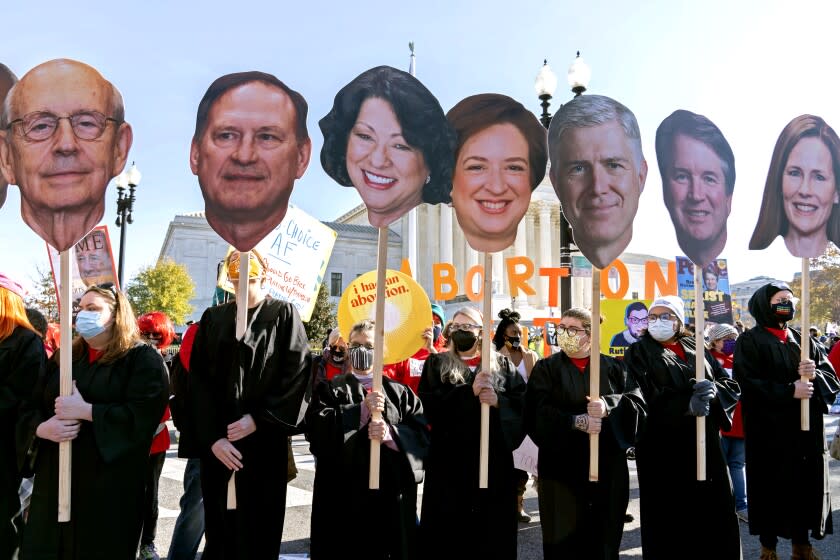Opinion: 'It is time for another revolution' — readers on abortion and a post-Roe world

For years, letter writers have lamented or yearned for the possibility (mostly the former) that Roe vs. Wade, the 1973 decision that found the Constitution protects a woman's right to choose to have an abortion, would be overturned. At least at the federal level — and certainly not in several states, where conservative lawmakers have pushed the limit of what abortion restrictions are constitutional — the letters were mostly addressing abstractions: What might happen if enough antiabortion justices were appointed and a state law clearly meant to force the question on Roe made it to the Supreme Court?
That's no longer just a possibility. On Wednesday, the justices heard oral arguments on the Mississippi law banning abortions after 15 weeks of pregnancy, a deadline that flouts the viability standards set in Roe and the 1992 decision in Planned Parenthood vs. Casey. The justices indicated they were likely to uphold the Mississippi law.
So this week, for the first time in a generation, you are reading letters on abortion reacting to actual utterances by justices who will probably gut or overturn Roe.
———————
To the editor: How dare Supreme Court Justice Amy Coney Barrett tell women who do not want to raise a young child to just "put it up for adoption." Like too many adoptive parents, she is both blind and insensitive to the issues of grief and loss associated with child relinquishment, both for the birth parents and the relinquished children.
People who say "Why doesn't she just give the baby up for adoption?" don't have a clue what they're asking. I know. I've placed a child for adoption.
Although everyone's experience is unique, most first mothers I know describe placing their child for adoption as one of, if not the, most painful experiences of their lives. Relinquishing your rights by purposefully surrendering any further control over your child's future leaves a gaping hole that's impossible to fill.
I chose to place my son for adoption for many reasons, just like I chose to have an abortion. They were my reasons and my choices to make, the consequences of which only I can carry.
The choice of whether to terminate or continue a pregnancy, or to parent or not, is highly personal, often painful, and should remain exclusively the right of the individual in question — not a judge, not a movement, not a religion.
Candace M. Cahill, Denali National Park, Alaska
..
To the editor: Barrett may or may not be qualified to be a justice, but she is definitely not qualified or entitled to proclaim that a woman's life or career would not be greatly impacted by carrying an unwanted pregnancy to term and putting the child up for adoption.
Will she be caring for the four children of the woman prescribed bed rest for the next three months because of the toll the previous pregnancies have taken on her body? Will she be paying for the therapy of the raped woman and replacing her lost earnings? Will she stand up for the woman who had to leave work because of complications with her unwanted pregnancy and was not rehired?
No, Barrett is not qualified to suggest anything to any woman or any man as to how best to live their life. That is not her job and she should not use her personal opinions as justifications for judicial decisions.
Ruth Silveira, Los Angeles
..
To the editor: So, almost four months isn't enough for someone to decide whether they need an abortion? No? Is this not a ridiculous question?
Julie Domeny, Davis, Calif.
..
To the editor: The lawyer for Mississippi made the obtuse argument that because the Constitution does not mention abortion, then abortion is not protected by the Constitution. He's not telling us what we don't already know.
The Constitution also does not contain the words "woman," "women," "girl" or "girls." To most of the framers, women were ciphers, irrelevant, blips. The Constitution does state in the 14th Amendment that all persons are entitled to due process and equal protection. And we women and girls are persons.
During oral arguments, Justice Sonia Sotomayor asked, "Will this institution survive the stench that this creates in the public perception that the Constitution and its reading are just political acts?" Abigail Adams offers a solution to what the six right-wing justices are doing to our high court:
"If particular care and attention is not paid to the ladies, we are determined to foment a rebellion, and will not hold ourselves bound by any laws in which we have no voice or representation."
It is time for another revolution. While the male colonists threw tea into Boston Harbor, we women should throw teapots into the Potomac (since women generally had to brew the tea) while declaring our bodies off limits to all politicians and judges.
Patricia Barry, Los Angeles
..
To the editor: As a woman, I am tired of men controlling my decisions regarding my body.
If Roe vs. Wade is overturned, I want a law passed requiring men to get vasectomies at the age of 18 until they are willing and capable of taking care of their children.
If my body is going to be controlled, so must a man's. Otherwise, it is selective enforcement.
Charlene Emerson, Inglewood
..
To the editor: You recently published a picture of people praying to end abortions. Better they should pray to end shootings in schools and elsewhere.
I am sickened by recent portrayals of what this country has become: rabid objections to critical race theory taught in schools, but ending what is essentially a private and personal choice by women and girls.
Shelley Keith, Sherman Oaks
This story originally appeared in Los Angeles Times.

